Ligia and I met Ed and Pilar when I joined World Neighbors in 1989. Fortunately, I came on board just as an international conference was taking place, so we met all of the overseas Area Representatives. I remember Ed since he was the most welcoming person I met in my early days in Oklahoma City, and he radiated an aura of Christian caring.
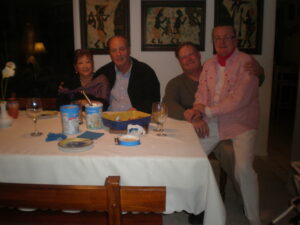
Ligia remembers the conference because Pilar prepared a dinner some Chilean delicacies, including “the best Ceviche I have ever eaten!” Thus started a lifelong friendship. Our cross-border matrimonies have produced three children apiece—always two girls and one boy. We’ve traveled the world helping those in dire straits while raising our own children in a way that makes us proud and World Neighbors impacted what I’ve done and who I am in many ways, so it’s no surprise that I include part of that story in my memoir, Different Latitudes. In Chapter 6, I focus on “Global Surveys & Evaluations” with a quote from Chinese philosopher Lao Tzu: “A leader is best when people barely know he exists. When his work is done and his aim fulfilled, they will say: We did it ourselves.”
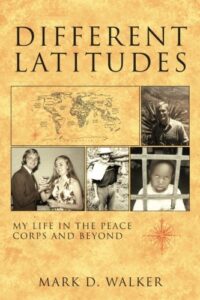
Fundamental to Ed’s leadership approach was that none of the work was a “World Neighbors” project but of the local community. He also focused on developing local leadership, which was a plus since most of the sites were extremely isolated. He recruited and trained the three Beingolea brothers who worked with local communities in Ayacucho, Peru, Bolivia and Ecuador.
One of those sites was Potosi, Bolivia, one of the highest cities in the world at 13,420 feet. The road getting there was a doozy! The key to riding the dusty roads was, whatever you do, don’t look down!
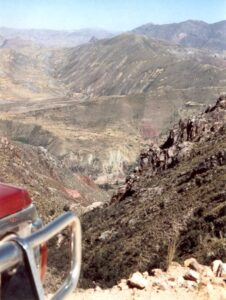
A long way along, Ed turned around and passed me a small jar of Vicks Vapor Rub. I asked, “Ed, what’s this for?” He responded, “Line your nose with this so you don’t breathe in all the dust!” And it worked!
In 1992, S.E. Asia Area Representative Larry Fisher included Ed and me in a Ten-Year Assessment. He also invited a series of development experts from the Ford Foundation, Save the Children, OXFAM, and the Canadian Peace Corps, as well as leaders from Indigenous groups and foundations who implemented the programs. We began the workshop by assessing the region’s needs, challenges, and future needs. Then, we split into small groups and visited the programs. Ed and I were part of Larry’s team, and our first stop was the island of Sumba, which, unbeknownst to me, had an 8,000-foot mountain. Here’s the rest of the story,
Our first stop was the island of Sumba, in the eastern Indonesian province of East Nusa Tenggara. Most of the original forest had been cleared for planting maize and cassava, among other crops. This and the growing population threatened both the forests and bird life.
Larry had spent so many years visiting and living in local communities like the ones we’d see on the island of Sumba that he might not have been aware of the needs of an outside group not used to these conditions. He provided us with thin, cotton bed covers as our only blanket, and we slept on bamboo floors each night. The first night, we slept in a lean-to on the top of a mountain, where the temperatures dropped rapidly as the sun went down. Between this and the constant walking, my back suffered. I would have suffered even more if my friend and World Neighbors area representative for Latin America, Ed Ruddell, hadn’t brought along a “space blanket,” an aluminum foil-like covering that the astronauts supposedly used to keep body heat in, and it worked well. I got a solid night’s sleep.
During the day, we hiked from community to community and visited their farms, local experiments, and extensive agroforestry work. These efforts were necessary since the dense population had devastated the local ecosystems, and forests had almost disappeared on some parts of the island. When we were leaving one village in the afternoon, I caught a scene out of the corner of my eye that prepared me for that evening’s meal. Some villagers were skinning and cooking a dog over an open fire.
Ed’s comment that when we enter a village for dinner,” keep your eyes out for where the stray dogs are” had a new meaning. I could always count on Ed to help me deal with the unexpected and show a fellow traveler kindness no matter what or where.
The next chapter of my book covered “Fundraising for International NGOs,” which Ed, Pilar, and I did a lot of together. The chapter begins with a Chinese proverb which reflects our shared appreciation of the power of philanthropy,
If you want happiness for an hour, take a nap.
If you want happiness for a day, go fishing.
If you want happiness for a month, get married.
If you want happiness for a year, inherit a fortune.
If you want happiness for a lifetime, help someone else.
Over the years, we organized donor tours to Bolivia, Chile and Ecuador, although we almost lost Anne Estes due to the altitude of La Paz, which has one of the highest airports in the world. Ed kept his cool while the airport staff rushed over with an oxygen tank to Anne, who had fainted. I realized that this wasn’t the first time Ed had dealt with this, although I was a nervous wreck.
Ed and Pilar were the best overseas fundraising team. They appreciated the importance of individual donors to the future of World Neighbors and cared about their physical and mental well-being. They were always attentive to our donors’ needs while also helping everyone respect what was best and most appropriate for the communities we were working with.
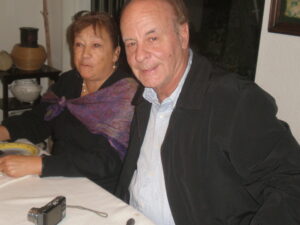
We worked together, obtaining several sizable grants from the Bergstrom’s and the Hewlett Foundation for Pilar’s preventive health care program in the highlands of Ecuador. The quality reporting and success of the program led to a $4 million grant from the Gates Foundation.
I left World Neighbors in 1993, but Ed and I continued to raise funds together. Ed was the President of Camps Farthest Out International (CFOI) for four years, a global outreach of creative Christian living. In 2007, he asked me to help organize a Spring fundraising campaign and strengthen their volunteer “Ambassador” program. Ed organized several retreats in California for what I called my Philanthropic Quest. He always had the right people in the room and followed up with them to ensure our plans became a reality.
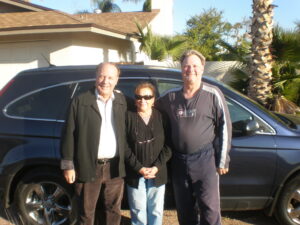
Over the years, we visited the Ruddell’s in California and Denver and stayed in their home, and they were in our home in Scottsdale. Truly good friends are hard to come by and even more difficult to maintain, but Ligia and I always felt a special Kinship with the Ruddell’s, and Ed will be greatly missed.
We need friends.
Friends guide us, care for us,
Confront us in love, console us in times of pain. The more able we are to receive the different gifts our friends have to give us, the more able we will be to offer our
Own unique but limited gifts. Thus, friendships
Create a beautiful tapestry of love.
Bread for the Journey in The Spirituality of Fundraising by Henry J.M. Nouwen